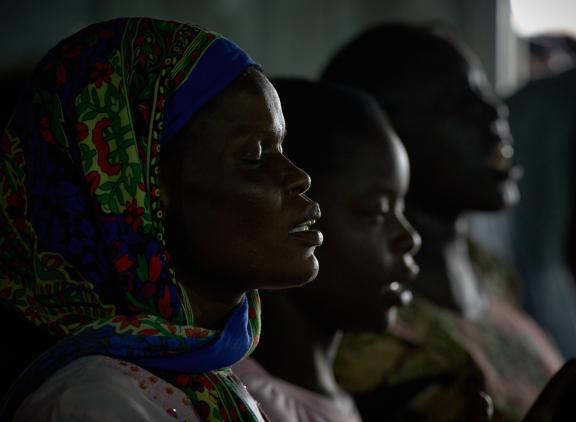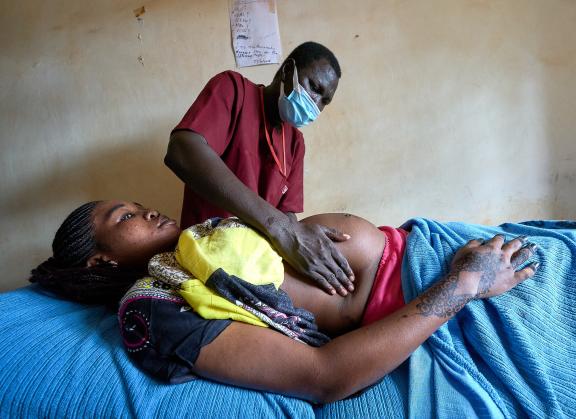By Paul Jeffrey*
“Sometimes in my work I feel hopeless, but then I feel a push. That means there is someone over there praying for us. It could be in the United Kingdom, or the United States, or in the World Council of Churches, or the All Africa Conference of Churches, but somebody is praying for us in South Sudan. That’s why we still hold the hope to move forward,” said Father James Oyet Latansio, a Catholic priest who serves as general secretary of the South Sudan Council of Churches.
Latansio acknowledged that compassion fatigue has dulled the zeal of many in the international community who want to help Africa’s newest country.
“We’re trying our best to let the voice of Christ be heard, the peace of Christ be sustained. But the challenge of violence is high. So we need your prayers. We need you to hold our hand as we journey through these challenges in South Sudan,” he said. “Don’t get tired of talking about South Sudan, or holding the hand of South Sudan. Accompany us as we journey toward the light of hope.”
South Sudan gained its independence from Sudan in 2011, but by 2013 a civil war had broken out, sending millions fleeing to refugee camps in neighboring nations or seeking safety on United Nations bases throughout the country.
In July of last year, the country observed the tenth anniversary of its independence.
“There was nothing to be celebrated. There’s no service, no development, people are dying because of violence in the streets. They talk of ‘unknown gunmen’ in Juba and elsewhere. Someone comes to your house and shoots you and they talk about ‘unknown gunmen.’ But who are those who hold guns in the country? Are they not the military guys and the police?” asked Latansio.
“It’s the common man and woman who are the victims. You plant your garden, but you can’t harvest it. They come and shoot in the air, or shoot at you, and set fire to your roof. What do you wait for? You leave everything in the field and don’t harvest it. Then they come and try to sell it back to you,” he said.
“The Jesus who became flesh and dwelt among us? That Jesus is still suffering in South Sudan.”
A 2018 ceasefire, ambitiously named the Revitalized Agreement on the Resolution of the Conflict in the Republic of South Sudan, brought temporary hope for an end to fighting. Yet it quickly became apparent that the agreement simply wasn’t working as intended. Measures aimed at sharing power between the government and rebel groups failed to produce peace on the ground.

Women pray during Sunday Mass at the Catholic Church inside the Protection of Civilians area in the United Nations base in Malakal, South Sudan. Some 35,000 people live in the camp, protected by UN peacekeeping troops. They were displaced from Malakal following the outbreak of a civil war in 2013. The armed conflict has a strong element of ethnic tension, and the mostly Shilluk and Nuer residents of the camp fear for their security from the largely Dinka population that has moved into their former town.
According to John Ashworth, an advisor to the South Sudan Council of Churches, the warring parties agreed to the wrong peace process.
“They’ve taken up a model of power sharing, but power sharing between elites is not going to resolve the problems of South Sudan. There are many conflicts, each with their own root causes, which make up the larger conflict. Not everyone is fighting for the same reason, even if they’re fighting on the same side. And people are changing sides rapidly. They may well be in an alliance with someone at some point, but when things change, they may find themselves out with that person. It’s a complex thing,” said Ashworth.
“For most ordinary people, the violence hasn’t abated. The agreement hasn’t brought a ceasefire in reality.”
Although the Community of Sant'Egidio has attempted to quietly push along the peace process, Ashworth says several requirements of the 2018 agreement, including the unification of the national army and the formation of a transitional justice system, have yet to be implemented.
“Although we have a signed peace agreement, we don’t have the political will from the country’s leaders to implement the agreement,” he said.
Latansio complained that space for civil society is getting narrower. He pointed to a public protest against violence and corruption that was planned for August. It was called off at the last minute after the government threatened to respond with violence.
“This government is now squeezing civil society groups just because they want to make a sit-in, a peaceful protest. So they start arresting anybody who is tied to a civil society organization,” he said.
A cattle keeper holds an assault rifle in Mogok, South Sudan. Cattle raiding between neighboring tribes has long been a tradition in South Sudan, but the acquisition of high-powered weapons has turned the practice into a blood sport, and politicians and warlords have enlisted the armed cattle keepers as allies in acquiring and maintaining territory.
“I don’t know where we’re heading. The international community complains, but the leadership believes that only the force of the gun can keep them in power. They even said that they don’t have rubber bullets. They don’t have tear gas. They only have live bullets. Come and sit in and we shall shoot you. So on the 30th of August, all over the streets, you get well-armed military guys ready to shoot. Even if you’re only a gathering of five people, if they tell you to move and you don’t, they will start to fire,” he said.
“In spite all this, we are still committed to work for peace, and change this narrative of violence to that of peace.”
Although the church has long lobbied for peace and authentic reconciliation in the area, including during the long struggle for independence, Latansio says Christians aren’t without blame for the current chaos.
“Many of us are part-time Christians. We go to church, but after church we go back to square one. In the violent context of South Sudan today, who is doing this violence? Is it Muslims? Is it pagans? No, it is Christians. It is my Christian brother and sister,” he said. “They are doing harm to the image of God.”
To push the churches into peacebuilding, the church council developed an Action Plan for Peace. Fostering dialogue is a central element of the plan, but Latansio says that frank discussion between warring groups must often take place outside the country.
“Most of the dialogue must be done outside the country. Inside there’s no trust. You’re afraid that if you speak your heart that it will be registered, they’ll hunt you out, you’ll be arrested or they’ll shoot you,” he said.
The peacebuilding ministry of the country’s churches continues despite increasing attacks on religious workers. The 16 August killing of Sacred Heart Sisters Mary Daniel Abud and Regina Roba, who died with several others during an attack by “unknown gunmen” on their chartered bus on the road between Juba and Nimule, appears to demonstrate that the church has lost any special status it once enjoyed.
“It’s a sign that the church isn’t respected as it once was. During the long civil war, we didn’t see this happening. Today the church isn’t being respected, it’s suffering the same as ordinary people,” said Ashworth.
Nonetheless, Latansio says, Christians continue working to make hope a reality in the troubled country. He says he’s thankful for so many who have come to South Sudan from other nations.
Protestant and Catholic church workers from around the world “are always on the frontlines risking their lives. Their service here isn’t a matter of the money they get. They just give themselves,” Latansio said.

David Mabil, a midwifery student at the Catholic Health Training Institute, performs a prenatal exam of Amelia John in the Wau Teaching Hospital in Wau, South Sudan. The CHTI trains nurses and midwives, and is sponsored by Solidarity with South Sudan.
For South Sudanese Christians, Latansio says he’s convinced that their decades of faithful witness will eventually yield a harvest of peace.
“We who were born in this context of war and violence, who grew up in it, who went to school in it, who studied in the seminary during war, who were ordained during war, even today we are still serving in the middle of war. But we believe that there is something great for South Sudan still to come. We are still on the journey of reaching what the Lord has promised to us.”
Paul Jeffrey is a freelance journalist from the United States. He’s a founder of Life on Earth Pictures.







